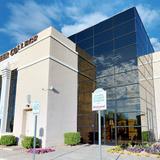- DSC is a publicly supported institution'authorized by the Utah State Board of Regents'with two interdependent tiers. DSC offers associate degrees and certificate programs that meet the needs of students, the community and the state. The College also offers baccalaureate programs in high demand areas and in core or foundational areas consistent with four-year colleges. Dixie State College enhances its campus climate by promoting cultural and demographic diversity, and by inviting students to participate in its open-door, post-secondary educational programs.
School Highlights
Dixie State University serves 11,193 students (59% of students are full-time).
The college's student:teacher ratio of 13:1 is higher than the state community college average of 12:1.
Minority enrollment is 24% of the student body (majority Hispanic), which is more than the state average of 23%.
Quick Stats (2024)
- Enrollment: 11,193 students
- In-state tuition: $4,456
- Out-state tuition: $12,792
- Student:teacher ratio: 13:1
- Minority enrollment: 24%
- Source: Integrated Postsecondary Education Data System (IPEDS)
School Overview
The teacher population of 877 teachers has stayed relatively flat over five years.
Dixie State University
(UT) Community College Avg.
Carnegie Classification
Baccalaureate/Associate's Colleges: Mixed Baccalaureate/Associate's
Doctoral/Research Universities--Extensive
Institution Level
Less than 2 yrs
Four or more years
Institution Control
Public
Public
Total Faculty
877 staff
154 staff

School Calendar
Student Body
The student population of Dixie State University has stayed relatively flat over five years.
The student:teacher ratio of 13:1 has stayed the same over five years.
The Dixie State University diversity score of 0.41 is more than the state average of 0.39. The school's diversity has stayed relatively flat over five years.
Total Enrollment
11,193 students
1,545 students

Student : Teacher Ratio
13:1
12:1

# Full-Time Students
6,580 students
501 students

# Part-Time Students
4,613 students
1,044 students



# Enrollment Undergraduate
656 students
176 students
# Full-Time Undergraduate Students
6,557 students
501 students

# Full-Time Graduate Students
23 students
28 students



# Part-Time Undergraduate Students
4,603 students
2,172 students
# Part-Time Graduate Students
10 students
371 students


Total Dormitory Capacity
720 students
750 students

% American Indian/Alaskan
1%
1%

% Asian
1%
2%

% Hispanic
12%
11%

% Black
2%
1%

% White
76%
77%

% Hawaiian
1%
n/a

% Two or more races
4%
3%

% Non Resident races
2%
2%

% Unknown races
1%
3%


Diversity Score
0.41
0.39

College Completion Rate (Students who graduate in less than 4 years)
n/a
56%
College Completion Rate (Students who graduate in 4 years or more than 4 years)
8.41%
0.57%
Average Graduate Earnings (10 Years)
$39,600
$32,700

Tuition and Acceptance Rate
The public in-state tuition of $4,456 is less than the state average of $6,267. The in-state tuition has declined by 7% over four years.
The public out-state tuition of $12,792 is less than the state average of $13,852. The out-state tuition has declined by 7% over four years.
In-State Tuition Fees
$4,456
$6,267

Out-State Tuition Fees
$12,792
$13,852

% Students Receiving Some Financial Aid
92%
87%

Median Debt for Graduates
$15,021
$15,972

Median Debt for Dropouts
$5,500
$6,334

Acceptance Rate
n/a
100%
SAT Reading
n/a
545
SAT Math
n/a
550
ACT Composite
n/a
23
ACT English
n/a
24
ACT Math
n/a
23
Source: 2021 (or latest year available) Integrated Postsecondary Education Data System (IPEDS) , School Administrators
School Notes
- Dixie State College of Utah is a state supported college with a two-tiered mission under the direction of the Utah State Board of Regents. First, it is a comprehensive community college designed to meet the educational, technical and vocational needs of the community. Second, Dixie State has been authorized by the regents to offer four-year degrees that are in demand in the local area. Currently, four baccalaureate programs are provided: business administration, computer and information technology, elementary education, and nursing. The college is fully accredited by the Northwest Association of Schools and Colleges and is a member of the American Association of Community Colleges and the American Council of Education. When the Civil War threatened a shortage of cotton goods in the West, Brigham Young, the 'Mormon Colonizer,' sent 300 families to southwestern Utah to raise cotton and build a factory for manufacturing cloth. This colonization, which began in 1861, was an historic epic in hardship and struggle. The combination of semi-tropical climate and cotton raising caused early settlers to refer to the area as Utah's Dixie ' hence the name Dixie State College. When it began operation in 1911, the school was officially called the St. George Stake Academy, but it was soon nicknamed 'Dixie Academy.' In 1923 it became Dixie Junior College, and in 1970, Dixie College. In July of 2000, the school officially became known as Dixie State College of Utah as it added four-year degree programs to its academic offerings. Thus, in one form or another, the name has endured. The college offers Associate of Arts (AA), Associate of Science (AS), Associate of Science in Business (ASB), Associate of Pre-Engineering (APE) and Associate of Science in Criminal Justice degrees. Bachelor Degrees are offered in Business Administration, Computer & Information Technology, Elementary Education, Nursing (BSN) and Communication & New Media.
Frequently Asked Questions
How much does Dixie State University cost?
Dixie State University's tuition is approximately $4,456 for In-State students and $12,792 for Out-State students.
What schools are Dixie State University often compared to?
Dixie State Universityis often viewed alongside schools like Snow College by visitors of our site.
Recent Articles

Retaining Students through Innovation
Community colleges are heeding President Obama's call for student retention. Learn about the innovative programs some community campuses are creating that keep students in their classroom seats.

Community Colleges Fight Back Against For-Profit Attacks: The Rebuttal
After being attacked by private colleges, community colleges are mounting a defense and publishing studies that clearly outline the differences between the public and private institutions.

June 17, 2024
A to Z of Community College Certificates and CoursesFrom business and healthcare to technology and skilled trades, the article showcases the breadth of options available to students seeking to enhance their knowledge, develop new skills, or pursue career advancement.










